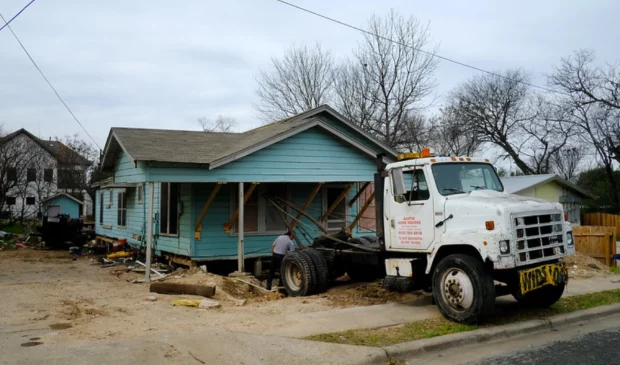Photo by Jorge Sanhueza-Lyon/KUT. The city of Austin is looking at the barriers that keep people from relocating homes instead of demolishing them.
Austin wants to make relocating a home easier to reduce waste and create affordable housing
Friday, November 3, 2023 by
Luz Moreno-Lozano, KUT In a move to create more options for affordable housing while also reducing waste, the city of Austin is trying to make it easier to relocate homes.
When a builder comes in to redevelop a lot, the existing home is often demolished because it’s easier and cheaper than relocating it. Those materials then end up in the landfill.
Developers say it’s difficult and expensive to relocate a home in Austin; there’s a complicated permitting process and fees, limited land, and money and land rules. Many of the homes that do get moved end up outside the city.
On Thursday, Austin City Council approved a resolution directing the city manager to look at how to remove some of those barriers so more homes can be reused for affordable housing, while building materials can be kept out of landfills.
But the city has to figure out how to make this easier first.
An expensive and complicated process
Council Member Ryan Alter, who authored the resolution, said he wants to raise awareness that home relocation is an option and create a place to sell these structures. He is also pushing to streamline city processes so it’s cheaper and faster to relocate a house within city limits.
Alter said simplifying home relocation options helps the city work toward two goals: affordable housing and zero waste.
“With concerns that increased density will result in the demolition of older, smaller homes, house relocation provides an opportunity to preserve existing housing,” he said.
He said repurposing a home that is already built can be cheaper than building a new home and that structures like accessory dwellings can be moved within a lot or to a separate piece of land. Additionally, he said, relocation helps divert waste from landfills.
“We need to do everything we can to not only address our affordability crisis, but our climate crisis,” Alter said.
But relocation is still complicated.
Matt Rogers, who leads the Guadalupe Neighborhood Development Corp., said it can cost more than $200,000 to relocate a house and then rehab it so it can be sold. The nonprofit does this kind of work in East Austin.
“A lot of times people just think we can move a house and then it’s good to go,” he said. “But it doesn’t work like that.”
He said the house has to be unique and worth the move in the first place. There also needs to be a place to put the home (i.e., land) and then it has to be fixed up – sometimes replacing windows, the roof and flooring.
Rogers said the two main challenges with relocating homes are land and money. Then there’s the permitting process and land rules.
“I don’t know how they are going to alleviate those challenges – land, money, the permitting process,” he said.
Homes as ‘opportunities, not trash’
The effort to make home relocation easier garnered support from Preservation Austin and the Austin Board of Realtors.
In a letter to City Council, Taylor G. Smith, deputy director of government affairs for the Austin Board of Realtors, wrote: “simplifying the housing relocation process and creating incentives to relocate older homes within the City of Austin could benefit our housing stock.”
Melissa Barry, president of Preservation Austin’s board of directors, agreed.
“Every year hundreds of smaller and historic-age homes are demolished and thrown into the landfill,” she said. “We see these homes as opportunities, not trash, and laud the Council member for his leadership in shifting this narrative.”
Council Member Leslie Pool said making home relocation easier is going to be helpful as the city works to create more affordable housing. Over the last year, the Austin City Council has eliminated parking requirements, and is working to make other changes to height restrictions and increasing the number of homes allowed on a piece of land.
“It’s important to have options for existing structures,” she said. “Existing homes have value, and relocating a house on-site or elsewhere should be easier than getting a demolition permit.”
The city manager and staff will look at the city’s rules and processes and make recommendations to Council by March.
This story was produced as part of the Austin Monitor’s reporting partnership with KUT.
The Austin Monitor’s work is made possible by donations from the community. Though our reporting covers donors from time to time, we are careful to keep business and editorial efforts separate while maintaining transparency. A complete list of donors is available here, and our code of ethics is explained here.
You're a community leader
And we’re honored you look to us for serious, in-depth news. You know a strong community needs local and dedicated watchdog reporting. We’re here for you and that won’t change. Now will you take the powerful next step and support our nonprofit news organization?






